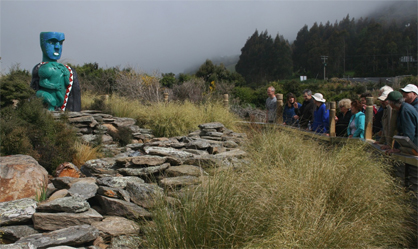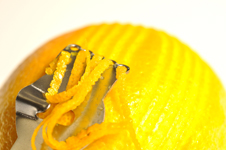What is a Green Team and why does the Department of Zoology have one?
Green Your Scene is a University of Otago initiative. Green Teams work alongside the University's wider programme of sustainability. The Zoology Green Team was started in 2014.
The aim of Zoology Green Team is to support and encourage environmentally sustainable behaviours within the Department of Zoology, and foster outreach activities by our graduate students and staff.
What can YOU do to maximise environmental sustainability?
REDUCE: Environmental sustainability starts by minimising resource use. Heating is the biggest source of energy use on campus and travel (into work, to conferences, etc) is the biggest source of energy use overall. Our buildings in Zoology use a range of heating sources, many of which can be manually adjusted. Use heaters as you would in your own home. If you are not going to be in your office for an extended period of time, switch off the heating. Use of extra or personal heaters is not recommended due to energy usage and safety concerns. Any problems with heating can be reported to our technical staff by emailing erik.liepins@otago.ac.nz. Turn lights off when you leave your office or tea-room. Try to avoid disposable resources if reusable alternatives are available. Think before you print– is it essential to have a paper copy? Do you really need to use those disposable gloves in the lab/field? Could you use a smaller, more fuel-efficient vehicle for your research? Can you combine trips/flights for one purpose? Consider using teleconferencing or Skype as an alternative to travel. Minimise the number of animals that you use in your research. Avoid use of harmful chemicals or isotopes. Look for alternatives.
RE-USE: Many things can be used repeatedly before discarding. Re-use envelopes and filing containers from the container in the mailroom. Re-use fasteners or return to boxes in mailroom. Bring your re-usable cup if you are going outside the building to buy a take-away coffee. Re-use research equipment (e.g. collecting containers) where possible. Check with technical staff before buying items that may already be in the department.
RECYCLE: Environmental impact can also be minimised by recycling where possible. We aim to make recycling as convenient as possible around the department (see frequently asked questions). Let us know if you have any suggestions to make recycling even easier.
RAISE AWARENESS: Let people know about the environmental sustainability efforts of the department and let us know if you have any suggestions or questions. Reducing energy use provides direct savings that can be put to good use.
Frequently Asked Questions
Should I switch my computer off at the end of every day?
No, most computers in the department are backed up at night and this requires them to be left in sleep mode, so it's best to keep them all on. A computer left in sleep mode draws about 35 mA and a computer that is powered down about 30 mA. In comparison, a typical heater uses at least 300x as much power. Please ask our technicians if you would like further information about managing the power settings of a computer.
The heating isn't working in a room, what should I do?
An adequately heated workplace is essential and it is more efficient to fix a main heater than use extra space heaters. If a room is too cold or hot, please tell our technical staff (erik.liepins@otago.ac.nz).
I don't know how to annotate pdf documents, is there any training to help me become less reliant on printing?
IT Services run courses on creating and annotating .pdfs.
Sign up for a course here
Where do I recycle paper?
Mailroom bins (all types: white, coloured, news). Pick-ups: 1st and 3rd Wednesday of each month.
Where do I recycle cardboard?
The metal skip in the carpark in front of the Benham Building. Can be used for books that Regent Book sale won't take.
Where do I recycle cans and plastic?
Plastics 1, 2 and 5, steel cans and aluminium cans can be recycled in the wheelie bin in the tea-room. Please minimise use of this bin for paper and cardboard. No plastic bags, wrap or polystyrene.
Where do I recycle glass?
Glass bottles and jars can be recycled via the standard blue bin in the tea room
Where do I dispose of polystyrene, e-waste, batteries, toner cartridges, fluoresecent tubes?
These can be left at the pick-up point in the Benham garage. Graham Musgrave from Property Services keeps an eye on the levels. Batteries and many light bulbs should not be disposed of in regular waste as they leach toxins into the landfill.
What can I do with food scraps, tea bags, coffee grinds and dead flowers?
All compostables can go in the plastic bins next to the fridge in the tea-room, which are emptied daily.
If you are interested in finding out more about recycling and sustainability, check out:
Campus: http://www.otago.ac.nz/sustainability/resources/recycling-on-campus.html
DCC: http://www.sustainabledunedincity.org.nz/
Schools: http://otagoenviroschools.blogspot.co.nz/
Fun:http://kids.nationalgeographic.com/kids/games/actiongames/recycle-roundup/
Trashing our oceans:https://www.youtube.com/watch?v=Ta8HaHP_9rE
Killing our seabirds:https://www.youtube.com/watch?v=IbGDNpRTKxg
Threats to biodiversity
Like many biologists and conservation scientists, staff and students of Zoology are extremely concerned about biodiversity loss. In a recent survey, 100% of our academic staff members who research in this area considered the statement “A serious loss of biological diversity is underway at the global scale” to be “likely”, “very likely” or “virtually certain”. This mirrors a recent international survey of 583 conservation scientists in which 99.5% recorded the same levels of concern.1
Ways in which we contribute as a department to conservation of animals include:
- providing specialist advice to international organisations including the International Union for Conservation of Nature (IUCN), the International Whaling Commission (IWC), the Amphibian Survival Alliance (ASA) and the Science Advisory Board of Earthwatch Australasia
- providing specialist advice to species recovery groups of the Department of Conservation, including those for yellow-eyed penguins, black stilts, kakapo, blue ducks, parakeets, grand and Otago skinks, tuatara, endemic frogs and fish
- providing specialist advice to government - such as advice on water management to local and national departments and organisations (e.g. Ministry for the Environment and Otago Regional Council), advice on fisheries management to Ministry for Primary Industries, advise on conservation to the Department of Conservation
- providing specialist advice to assist local government and community groups (e.g. Otago Peninsula Biodiversity Group) with control of pest mammals
- research to assist our local community-based ecosanctuary, Orokonui Ecosanctuary, with reintroductions of robins, saddlebacks and tuatara (https://orokonui.nz/Education/Research)
- community education on conservation issues, including regular interviews in the national radio programme “Our Changing World”
- talks to local community groups including University of the Third Age (U3A) and Forest and Bird
- conservation-related activities with school students in programmes including the Otago University Advanced School Science Academy, Hands-on Science and Science Wananga
Various awards have been made to our staff in recognition of their efforts, including the Department of Conservation's Coastal Otago Conservation Award 2013 to Professor Ian Jamieson, the Auckland Zoo's Conservationist of the Year Award 2008 to Professor Phil Bishop and the Royal Society of New Zealand's Sir Charles Fleming Award for Environmental Achievement 2004 jointly awarded to Associate Professor Liz Slooten.
Many of our students give public and/or professional talks on conservation topics, and are actively engaged as volunteers in conservation-related projects (including several who have been awarded Outreach Certificates from the Division of Sciences).
We continue to discuss ways that we can engage more effectively as a department in this area.
1 Rudd, M. A. 2011. Scientists' opinions on the global status and management of biological diversity. Conservation Biology 25: 1165-1175.

Photo: Zoology staff view endangered Otago skinks (Oligosoma otagense) after an afternoon of volunteer work at Orokonui Ecosanctuary
Who are Zoology Green Team?
Students: Jerusha Bennett, Jasmine Sowerby, Luna Thomas
Staff: Caroline Beck, Anne Besson, Alison Cree, Ludovic Dutoit, Jenny Jandt, Graham McCulloch, Jo Monks, Priscilla Salloum, Sheena Townsend
Chair: Sheri Johnson
If you would like to join us, please contact Sheri

Zoology Green Team